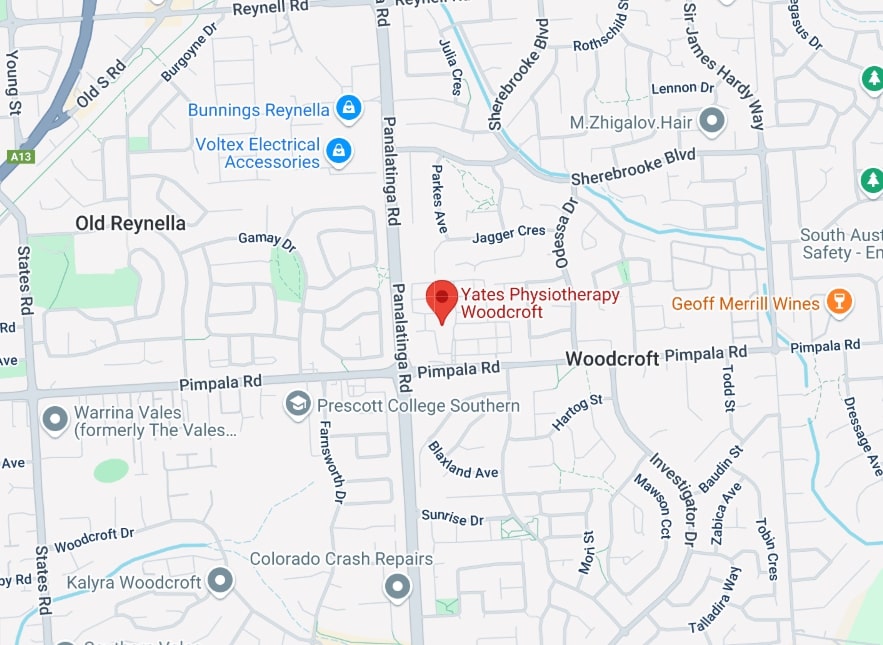On your first visit to our Woodcroft clinic, you can expect that our physiotherapists will undertake a detailed assessment, help you understand your diagnosis, and guide you through a tailored treatment plan.
Yates Physiotherapy Woodcroft offers a gymnasium and a private treatment room. The entrance of the Woodcroft clinic is inside the Wellness Centre.

Our flagship service goes beyond just treating symptoms. Our physiotherapists employ advanced techniques and evidence-based practices to identify the root cause of your condition. Our team understands that the only way for physiotherapy to be effective is to develop a customised treatment plan based on a patient's specific condition, health goals and lifestyle.
The process commences with a comprehensive assessment, where we understand your medical history, current condition, and personal objectives. This enables us to formulate a diagnosis and design a treatment plan. Our physiotherapists guide you through exercises tailored to your condition during the treatment phase. This could include manual therapies, mobility exercises, and practical advice to improve daily tasks.
Our flagship service goes beyond just treating symptoms. Our physiotherapists employ advanced techniques and evidence-based practices to identify the root cause of your condition. Our team understands that the only way for physiotherapy to be effective is to develop a customised treatment plan based on a patient's specific condition, health goals and lifestyle.
The process commences with a comprehensive assessment, where we understand your medical history, current condition, and personal objectives. This enables us to formulate a diagnosis and design a treatment plan. Our physiotherapists guide you through exercises tailored to your condition during the treatment phase. This could include manual therapies, mobility exercises, and practical advice to improve daily tasks.
Physiotherapy uses a range of techniques to help patients deal with injuries, chronic pain and other medical conditions. Many people can benefit from physiotherapy, especially those looking to increase their range of movement or reduce pain. If you suffer from any type of musculoskeletal condition or injury, you’ll likely benefit from physio.
That’s easy, just call the friendly team at Yates Physiotherapy. We offer a comprehensive range of services to diagnose and treat musculoskeletal problems as well as many other issues. The important thing to consider when choosing a physiotherapist in Adelaide is to find one that suits your needs. They should be experienced, highly trained, and attentive to your individual condition. That’s exactly what you get with Yates Physiotherapy.
There are plenty of conditions your physiotherapist can assist with, including:
This list is not exhaustive, so if yours isn’t included, please contact our team to check whether we can assist.
You don’t need a referral to see a physiotherapist, however many people do choose to see a GP first. Depending on your condition, other medical health professionals might be involved in your treatment and recommend physio. But if you know what the problem is and want to see a physio straight away, you just need to give us a call.
If your issue relates to a Workers’ Compensation or other type of claimable injury, in these circumstances, you would need a referral before seeing your physiotherapist.
If you fall under NDIS, Workers Compensation, My Age Care, CTP (Compulsory 3rd Party Insurance) or DVA then you will need a referral.
A physiotherapist, often called a physio, is a health care specialist dedicated to improving and maintaining patients' physical well-being through various tailored treatments. The physio is crucial in rehabilitation, helping individuals recover from injuries, surgeries, or chronic conditions. They perform detailed assessments to identify the underlying causes of a patient's physical issues and devise personalised treatment plans to enhance mobility, strength, and function.
A physio is vital in various aspects of life. For athletes, a physio helps prevent injuries and improve performance through targeted exercises and conditioning routines. For the elderly, physiotherapists support the management of age-related conditions such as arthritis, ensuring that seniors maintain their independence and quality of life. In workplaces, the physio contributes to ergonomic assessments and interventions to prevent work-related injuries, promoting overall employee health.
A physio is often part of multidisciplinary teams, working alongside other healthcare specialists, i.e., doctors, nurses, and occupational therapists, to hand out comprehensive care. Their contribution is essential in the continuum of care, ensuring that patients receive well-rounded rehabilitation and support.
Physiotherapy treatment treats various conditions and injuries affecting muscles, joints, and nerves. A physio uses techniques such as dry needling, manual therapy, and exercise physiology to treat these issues. At a physio clinic, patients can receive tailored treatments for sports injuries, post-surgery rehabilitation, and chronic pain management.
Physiotherapy also encompasses podiatry, which addresses foot-related problems to enhance overall mobility. A physiotherapist is pivotal in helping patients regain function and independence through specialized exercise programs in rehab settings. By incorporating physio treatments, individuals can improve their physical well-being and quality of life.
No, you generally do not need a referral to see a physio. However, some insurance plans may demand one for coverage. Physiotherapy offers a variety of treatment options, including hydrotherapy and clinical pilates. A physio plays a significant role in addressing sports injuries through sports physiotherapy, part of the broader field of sports medicine.
Treatments offered by a physio may include shockwave therapy and pain medicine tailored to relieve and manage pain. Many physiotherapists incorporate pilates into their physiotherapy programs to enhance rehabilitation. Sports physiotherapy is especially beneficial for athletes, as a physio designs specific exercises to prevent and recover from sports injuries.
Physiotherapy and the expertise of a physio can greatly enhance an individual's physical health and well-being. By consulting a physio without a referral, one can access physiotherapy treatments, including advanced hydrotherapy and shockwave therapy, for a comprehensive recovery approach.
A typical physiotherapy session with a physio usually lasts between 30 to 60 minutes, depending on the patient's condition and the nature of the treatment. During the appointment, the physio will conduct a thorough assessment and provide services such as manual therapy, remedial massage, and tailored exercise classes.
Physiotherapy clinics offer comprehensive facilities to address musculoskeletal issues, with physios expertly trained in various techniques, including dry needling and hydrotherapy. In addition to one-on-one treatment, physio services may include physiology-based rehabilitation plans and group exercise sessions.
The National Disability Insurance Scheme (NDIS) recognizes physiotherapy services for their efficacy in improving mobility and independence. Regular visits to physio clinics under the NDIS can ensure consistent progress and optimal results. The length of a physio session can vary, but each appointment is designed to maximize benefits and promote well-being through specialized services.
Physiotherapy usually costs between $100 - $130 per session, depending on your condition and the treatment required. If you have private health insurance with extras, some or all of these expenses may be covered. It’s crucial to check with your insurer to ensure you have physiotherapy services included in your package.
Absolutely! Physiotherapists are trained to deal with a wide range of sporting injuries. Whether you’re a sporting professional or a weekend warrior, injuries are a part of physical activity. Here at Yates Physiotherapy, our skilled sports physiotherapists can devise a treatment plan to get you back to your best quickly, while also helping to prevent injury recurrence.
It’s extremely difficult to say how long it will take before you notice results because every case is completely different. Some people recover more quickly than others, and of course, injuries and medical conditions come in all different levels of severity. Physiotherapy can sometimes feel like a slow process because you need to gradually build up your strength and range of movement. If you try to progress through your treatment pain too quickly, you put yourself at risk of repeating the injury.
There certainly are. Our qualified physiotherapists can work with children, and it’s not uncommon for kids to need some physio. Some children experience musculoskeletal conditions from a young age, and a physiotherapist can play a key role in helping them lead a more full and active life.




